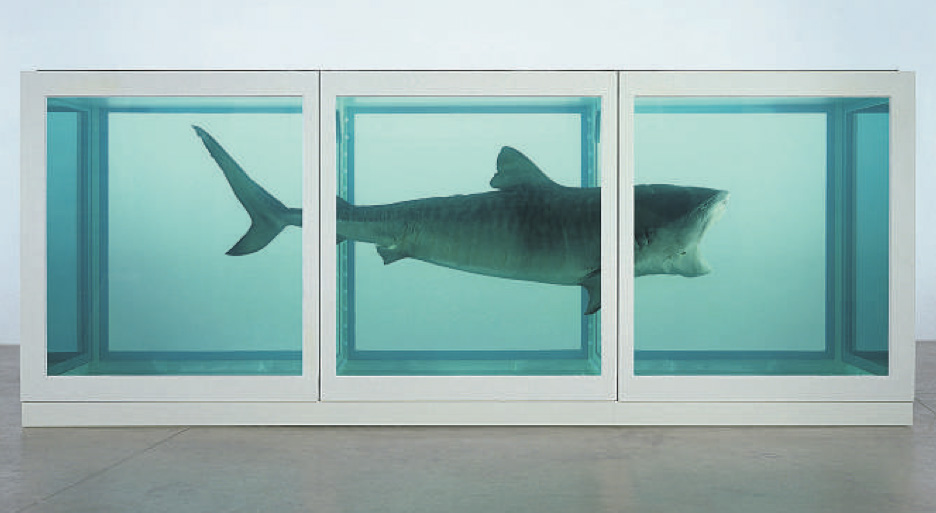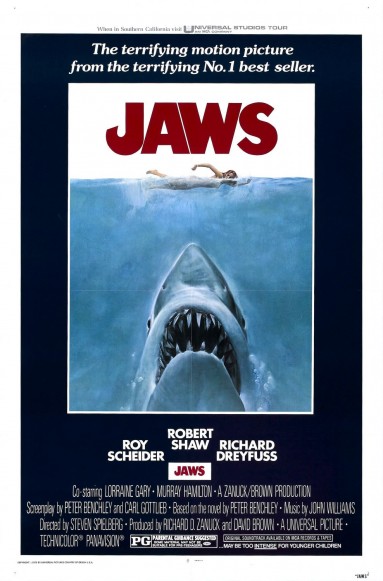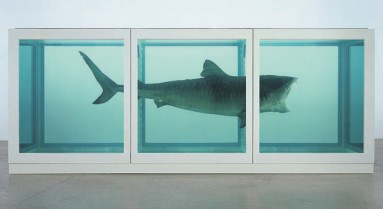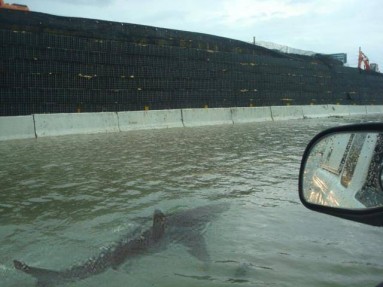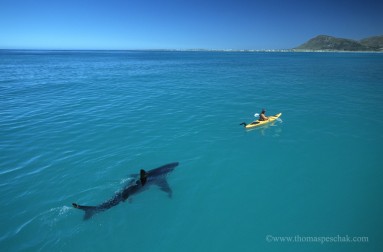Their predatory skill fascinates and frightens humans, even though their survival is threatened by human-related activities. [shark]
A 33-ton shark tank in a Shanghai mall exploded, injuring up to 16 people and leaving three sharks and dozens of turtles and fish dead. It was a ghastly event that makes for an ecologically apocalyptic moving image. Going beyond the real-life scenario of such a thing happening—and 'such a thing' has actually happened—I've been grappling with its symbolic power, that is, some way to answer for the fact that I watched it on loop a dozen or more times. (That's more times than Open Water and Open Water 2: Adrift, but not much more.) The what of the image is clear: what is the how of what it's doing?
It is a truthful moving image not only because it is real (in contrast to the Spielberg and Hirst works that are framed as fiction or art, or the variety of viral hoaxes) but because it delivers on the dystopia of a false ambient environment. You wanted a giant decorative aquarium? Here's your giant decorative aquarium. The post-flood images from 2011 and 2012 were digital manipulations, true. But the scenario they created was very different. In those distortions, 'nature' invaded urbanized terrains. The city-world's sudden amphibiousness bestowed a cold creepiness. They may have been startling images before they were debunked but their creators were concerned with a 1:1 causality (chaotic climate futures promise blowback—here's the blowback).
It's worth noting that Peschak, the marine biologist and nature photographer who took the 2003 photo duplicated in the viral hoaxes, said he was searching for a single photograph that could narrate his team's efforts to track white sharks on kayaks. Yet even that photo belies the experiment, since it casts the shark as chasing the humans. Even the attempt to good-faith effort to study sharks masked the disruptions the researchers' boat engines caused on their behavior. Peschak is more forthcoming about the limitations than most, and takes prudence in noting: 'White sharks, despite their bad reputation are much more cautious and inquisitive in nature than aggressive and unpredictable. At no time did any shark show any agression towards our little yum yum yellow craft.'
Both humans and sharks are apex predators, but the Shanghai mall disaster footage upends that equalizing categorization in a way nothing else has. The average number of fatalities between 2001 and 2006 from unprovoked shark attacks was 4.3; that means in a period of around six years, there were less than five unprovoked attacks on humans. This one incident alone could never account for the human-related activity that is leading sharks toward extinction (yes, that is really happening). But the scene of three lemon sharks flailing around on the floor of a mall next to a dilapidated Clarins boutique visualizes the depths of human uncare in an unexpected and ugh, excuse me for using this word, but postmodern way. It's a man-bites-dog story and it's got me feeling blue.
Theoretical timeline (proceeding from the visualizations above):
(1) the simulated shark as a post-Jaws ideology of fear,
(2) the encased shark as a post-Hirst ideology of art,
(3) the virtual-meme sharks as a climate ideology, and finally,
(4) the cracked shark tank in the mall as a consummation of fear and ideology.
